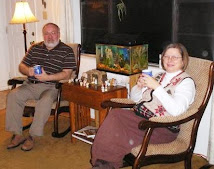I asked friends and family for their understanding of hospitality, and I received so many great responses, I want to share some of them here for future reference.
The most humorous response came from brother-in-law Larry, who said that hospitality is a fatality caused by running into a hospital! (One for the Alternate Dictionary to be sure, but there’s that connection between hospital and hospitality, too.)
Friend and former shipmate Jim L. said that being hospitable includes respect, i.e. greetings (good morning, how are you, etc.), smiles, courtesies (please and thank you). It is like the Boy Scout motto (be prepared). He said further that, growing up, family and friends were always welcome and walked right into the house because they knew they were welcome. “We did not have much growing up, but we freely shared what we had.” What beautiful examples of hospitality.
Friend Ingrid remembers her mother making everything special for visitors, and Ingrid does the same. Out come the good cups and saucers, the nice plates, a nice table cloth, and cakes on a nice plate. She wants always to make her guests feel special by taking the time and trouble to share her best things—the best of herself—with her guests. It reminds me of a quote from Rex Stout’s fictional detective, Nero Wolfe, who said “The guest is a jewel resting on the cushion of hospitality.” Ingrid likens it to the Friday night celebration of Shabbat, a special time to bring out special dishes, table clothes, to prepare the house for guests, and to serve a fine meal with wine.
Co-worker and friend Rick points out that hospitality is a trait that is learned from one’s upbringing, from past generations, and from the social environment in which one grows up. My memories of the models of hospitality in our life are what led me to write something in the first place, so I cannot disagree. He opines that if one is grounded and confident, one will be more gracious and welcoming.
Cousin Sharon, who lived in Austria for years, expanding on Ingrid’s response, was astonished at the formality and beauty of the table set when invited for coffee in that country. There would be a beautiful table cloth, lovely china, cake and cookies—homemade or from some local bakery, gleaming silverware and a bowl piled high with fresh whipped cream. And as a guest she felt cherished and honored. She quickly learned that Austrians brought fresh flowers to the host on such occasions—a beautiful way to recognize the gift of hospitality.
In Greece, living on the island of Santorini, Sharon found a very different hospitality—equally warm but much less formal. There were occasions when Greeks would pull out all the stops and set a lavish banquet table for friends and family—the women would cook for days, bring out their best linens, china and glasses. There would be free-flowing wine—usually from their own vineyards or from the village their family came from. But what struck her most was the informal hospitality that friends were welcomed any time and that dropping by was the norm (as Jim L. shared earlier). When she was flustered that her apartment, which was also her artist’s studio, was cluttered with silk painting in progress, she would be reassured, “Sharon, we came to visit you, not your house.” She learned to keep snacks on hand for visitors who dropped in unexpectedly. And she observed that Greeks always offered a glass of water and fruit preserves (called a “spoon sweet” in contrast to finger-food sweets like cookies or chocolates). A bowl of fancy chocolates was always kept on hand—individually wrapped and festive looking—to offer to guests. While a guest often enjoys coffee or a glass of wine or juice, if it is a quick visit, everyone accepts a glass of water, recognizing and receiving the hospitality.
Kathy’s co-worker Debbie, a four-time visitor to Greece, including Santorini, agreed with Sharon’s articulation of the lavishness of Greek hospitality. She said she didn’t think she had ever eaten as much as she did in Greece. One woman, after setting two tables full of food, said she wished she had had time to make more! And they really couldn’t afford to do it, but they made their guests feel very special, indeed.
Debbie was also astonished at the hospitality of local villagers in Yemen, who would invite you in and offer you tea and sunflower seeds, or in one instance, the last piece of bread and the one bottle of Coca-Cola they had been saving for a special occasion.
Friend and former shipmate George offered this beautiful point of view. “To me hospitality means making your guests feel as if they are the most important people in the world to you at that time. You listen to them, care about what they say, make them feel at home, provide something to eat or drink, allow them to choose where to sit and talk, and offer assistance in any concerns or needs they may have. In other words, simply be there for them 100% while they are in your presence. Don’t answer that phone! Walk away from the TV!”
Sister-in-law Heather distilled it all as follows: “Hospitality is simply making sure people feel welcome.”
Friend-from-YWAM-Spain Bill observes that children need to see hospitality and the grace of good food, friendship and conversation modeled for them. It needs to start early, or it will not be imprinted on their minds. We so often miss the important for the urgent; the garden of hospitality needs time and care to become a desirable meeting place.
Friend and medical worker Christi wrote that when she would have conferences with families in her clinic, she would get a pitcher of water and glasses and make sure everyone had water. Kindness goes a long way, and since some of the conferences were about things not going well, mouths would get very dry when tensions were high.
One of the great things about this discussion on Facebook was that it brought together six distinct groups of family and friends, few of whom had met one another outside their own group, to share thoughts on a vital subject. As for the Lichtys, about whom I began to write, Vicki has put together an excellent five-page teaching on hospitality from a biblical perspective that she is likely willing to share. The Bartholomews now own and operate a Bed & Breakfast—what a great way to show hospitality.
May we all continue to give and receive hospitality in increasing measure and find new and creative ways to be hospitable, one to another.
While researching this topic, I discovered a fascinating 76-page PDF exposition of hospitality here.



+(800x600).jpg)



































